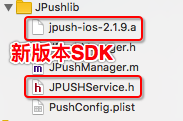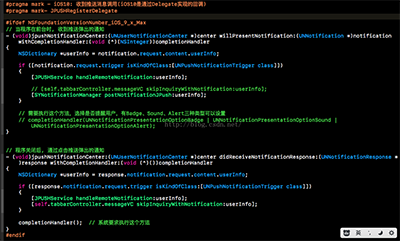iOS10发布后,发现项目中的极光推送接收消息异常了。
查了相关资料后才发现,iOS10中对于通知做了不少改变。同时也发现极光也很快更新了对应的SDK。
现在就把适配修改的做法分享一下,希望对有需要的童鞋有所帮助。
具体做法如下:
注意:必须先安装Xcode8.0版本。
一、添加相关的SKD,或framework文件
1、添加UserNotification.framework

2、更新jpush的SDK(最新版本:jpush-ios-2.1.9.a)https://www.jiguang.cn

二、进行路径和消息推送的配置
1、设置jpush的SDK的路径

2、开启消息推送功能

三、代码修改
1、添加userNotification的头文件

2、添加userNotification的启用代码

3、添加jpush的适配代码

4、添加jpush的代理和代理方法(注意:在appDelegate.m文件中使用)


补充:完整的使用极光
1、导入相应头文件
#import "JPUSHService.h" #import <AdSupport/AdSupport.h> #ifdef NSFoundationVersionNumber_iOS_9_x_Max // 这里是iOS10需要用到的框架 #import <UserNotifications/UserNotifications.h> #endif
2、启动极光推送功能
static NSString *JPushAppKey = @"6abc87b33b23d35b9c3b86e0"; static NSString *JPushChannel = @"Publish channel"; // static BOOL JPushIsProduction = NO; #ifdef DEBUG // 开发 极光FALSE为开发环境 static BOOL const JPushIsProduction = FALSE; #else // 生产 极光TRUE为生产环境 static BOOL const JPushIsProduction = TRUE; #endif [objc] view plain copy 在CODE上查看代码片派生到我的代码片 - (BOOL)application:(UIApplication *)application didFinishLaunchingWithOptions:(NSDictionary *)launchOptions { // Override point for customization after application launch. // 启动极光推送 // Required // - (BOOL)application:(UIApplication *)application didFinishLaunchingWithOptions:(NSDictionary *)launchOptions { } if ([[UIDevice currentDevice].systemVersion floatValue] >= 10.0) // iOS10 { #ifdef NSFoundationVersionNumber_iOS_9_x_Max JPUSHRegisterEntity *entity = [[JPUSHRegisterEntity alloc] init]; entity.types = (UNAuthorizationOptionAlert | UNAuthorizationOptionBadge | UNAuthorizationOptionSound); [JPUSHService registerForRemoteNotificationConfig:entity delegate:target]; #endif } else if ([[UIDevice currentDevice].systemVersion floatValue] >= 8.0) { // categories [JPUSHService registerForRemoteNotificationTypes:(UIUserNotificationTypeBadge | UIUserNotificationTypeSound | UIUserNotificationTypeAlert) categories:nil]; } else { // categories nil [JPUSHService registerForRemoteNotificationTypes:(UIRemoteNotificationTypeBadge | UIRemoteNotificationTypeSound | UIRemoteNotificationTypeAlert) categories:nil]; } // Required // [JPUSHService setupWithOption:launchOptions] // pushConfig.plist appKey // 有广告符标识IDFA(尽量不用,避免上架审核被拒) /* NSString *JPushAdvertisingId = [[[ASIdentifierManager sharedManager] advertisingIdentifier] UUIDString]; [JPUSHService setupWithOption:JPushOptions appKey:JPushAppKey channel:JPushChannel apsForProduction:JPushIsProduction advertisingIdentifier:JPushAdvertisingId]; */ // 或无广告符标识IDFA(尽量不用,避免上架审核被拒) [JPUSHService setupWithOption:options appKey:JPushAppKey channel:JPushChannel apsForProduction:JPushIsProduction]; // 2.1.9版本新增获取registration id block接口。 [JPUSHService registrationIDCompletionHandler:^(int resCode, NSString *registrationID) { if(resCode == 0) { // iOS10获取registrationID放到这里了, 可以存到缓存里, 用来标识用户单独发送推送 NSLog(@"registrationID获取成功:%@",registrationID); [[NSUserDefaults standardUserDefaults] setObject:registrationID forKey:@"registrationID"]; [[NSUserDefaults standardUserDefaults] synchronize]; } else { NSLog(@"registrationID获取失败,code:%d",resCode); } }]; return YES; }
3、注册
- (void)application:(UIApplication *)application didRegisterForRemoteNotificationsWithDeviceToken:(NSData *)deviceToken { [JPUSHService registerDeviceToken:data]; }
4、注册失败
- (void)application:(UIApplication *)application didFailToRegisterForRemoteNotificwationsWithError:(NSError *)error { NSLog(@"did Fail To Register For Remote Notifications With Error: %@", error); }
5、接收
- (void)application:(UIApplication *)application didReceiveRemoteNotification:(NSDictionary *)userInfo { // apn 内容获取: // 取得 APNs 标准信息内容 [JPUSHService handleRemoteNotification:dict]; }
6、处理通知
6-1、iOS10以下版本时
- (void)application:(UIApplication *)application didReceiveRemoteNotification:(NSDictionary *)userInfo fetchCompletionHandler:(void (^)(UIBackgroundFetchResult))completionHandler { DLog(@"2-1 didReceiveRemoteNotification remoteNotification = %@", userInfo); // apn 内容获取: [JPUSHService handleRemoteNotification:dict]; completionHandler(UIBackgroundFetchResultNewData); DLog(@"2-2 didReceiveRemoteNotification remoteNotification = %@", userInfo); if ([userInfo isKindOfClass:[NSDictionary class]]) { NSDictionary *dict = userInfo[@"aps"]; NSString *content = dict[@"alert"]; DLog(@"content = %@", content); } if (application.applicationState == UIApplicationStateActive) { // 程序当前正处于前台 } else if (application.applicationState == UIApplicationStateInactive) { // 程序处于后台 } }
6-2、iOS10及以上版本时
#pragma mark - iOS10: 收到推送消息调用(iOS10是通过Delegate实现的回调) #pragma mark- JPUSHRegisterDelegate #ifdef NSFoundationVersionNumber_iOS_9_x_Max // 当程序在前台时, 收到推送弹出的通知 - (void)jpushNotificationCenter:(UNUserNotificationCenter *)center willPresentNotification:(UNNotification *)notification withCompletionHandler:(void (^)(NSInteger))completionHandler { NSDictionary *userInfo = notification.request.content.userInfo; if ([notification.request.trigger isKindOfClass:[UNPushNotificationTrigger class]]) { [JPUSHService handleRemoteNotification:userInfo]; } // 需要执行这个方法,选择是否提醒用户,有Badge、Sound、Alert三种类型可以设置 // completionHandler(UNNotificationPresentationOptionBadge | UNNotificationPresentationOptionSound | UNNotificationPresentationOptionAlert); } // 程序关闭后, 通过点击推送弹出的通知 - (void)jpushNotificationCenter:(UNUserNotificationCenter *)center didReceiveNotificationResponse:(UNNotificationResponse *)response withCompletionHandler:(void (^)())completionHandler { NSDictionary *userInfo = response.notification.request.content.userInfo; if ([response.notification.request.trigger isKindOfClass:[UNPushNotificationTrigger class]]) { [JPUSHService handleRemoteNotification:userInfo]; } completionHandler(); // 系统要求执行这个方法 } #endif
7、其他注意事项
为了保证用户能正常接收,或有针对性的接收通知,登录成功后(或退出后)需要设置别名、标记。通常都是该逻辑都是写在用户登录APP成功之后,或者是用户退出当前登录状态后。
/// 绑定别名(注意:1 登录成功或者自动登录后;2 去除绑定-退出登录后) + (void)JPushTagsAndAliasInbackgroundTags:(NSSet *)set alias:(NSString *)name { // 标签分组(表示没有值) NSSet *tags = set; // 用户别名(自定义值,nil是表示没有值) NSString *alias = name; NSLog(@"tags = %@, alias = %@(registrationID = %@)", tags, alias, [self registrationID]); // tags、alias均无值时表示去除绑定 [JPUSHService setTags:tags aliasInbackground:alias]; }
以上所述是小编给大家介绍的解析iOS10中的极光推送消息的适配,希望对大家有所帮助,如果大家有任何疑问请给我们留言,小编会及时回复大家的。在此也非常感谢大家对查字典教程网的支持!
【解析iOS10中的极光推送消息的适配】相关文章:
★ 解析iOS开发中的FirstResponder第一响应对象
★ 详解iOS App中UIPickerView滚动选择栏的添加方法
